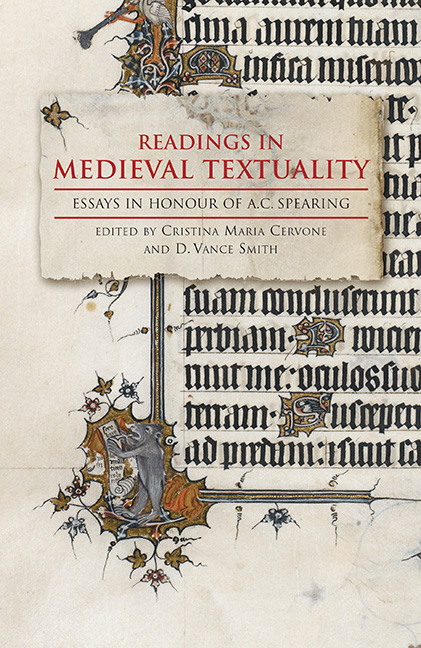Book contents
- Frontmatter
- Contents
- List of Illustrations
- List of Contributors
- A. C. Spearing's Work and Influence
- Bibliography of A. C. Spearing's Works
- I Reading Experience and Experientiality
- 1 The Wife of Bath's “Experience”: Some Lexicographical Reflections
- 2 The Proximity of the Virtual: A. C. Spearing's Experientiality (or, Roaming with Palamon and Arcite)
- 3 Makyng and Middles in Chaucer's Poetry
- II Revisions and Re-visioning of Alliterative Poetry
- III Subjectivity and the Self
- IV Reading for Form
- V Epilogue
- Works Cited
- Index
- Tabula Gratulatoria
3 - Makyng and Middles in Chaucer's Poetry
from I - Reading Experience and Experientiality
Published online by Cambridge University Press: 25 October 2017
- Frontmatter
- Contents
- List of Illustrations
- List of Contributors
- A. C. Spearing's Work and Influence
- Bibliography of A. C. Spearing's Works
- I Reading Experience and Experientiality
- 1 The Wife of Bath's “Experience”: Some Lexicographical Reflections
- 2 The Proximity of the Virtual: A. C. Spearing's Experientiality (or, Roaming with Palamon and Arcite)
- 3 Makyng and Middles in Chaucer's Poetry
- II Revisions and Re-visioning of Alliterative Poetry
- III Subjectivity and the Self
- IV Reading for Form
- V Epilogue
- Works Cited
- Index
- Tabula Gratulatoria
Summary
Chaucer's vexed relationship with endings is manifest in his poetry and thus, naturally, widely recognized by scholars. He leaves a substantial number of his works un-ended (which, as has been noted, is not the same as unfinished) – from Anelida and Arcite to the Squire's Tale, from House of Fame to Thopas to the Legend of Good Women. Moreover, he ends some without finishing them (the Canterbury Tales), while over-ending others: Troilus has several endings, as does the Clerk's Tale, while the Parliament of Fowls’ concluding harmony contrasts with the irresolution of its narrative. And the works that do not end fail to do so – or succeed in doing so – in various ways that we cannot always definitively distinguish: fictional interruption, deliberate incompletion (to make a point; out of boredom), unintended incompletion (due to distraction or death), perhaps even manuscript loss: what happened to those missing entries from the “Book of the .xxv. [or .xix.] Ladyes,” which now has only ten?
A. C. Spearing has persuasively argued that this pervasiveness of unfinished poems and of “traces of plans not followed through” is characteristic not of any lack of artistic resources but of Chaucer's “willingness to recognize and welcome the improvised and the arbitrary” and thus to approach, artistically, what Spearing, following Gary Saul Morson, calls “life as it is experienced.” I want here to pursue Spearing's skepticism about the extent to which Chaucer's poetry can be read as “perfect fulfillments of perfectly conceived plans.” How far the desire for such perfection can go is suggested by Lee Patterson, who, noting that un-endingness is not just characteristic but seemingly almost constitutive of Chaucer's poetry, argues that “Chaucerian incompletions in general, whatever the efficient cause in any particular instance, are governed by some larger plan, that from a cosmic perspective even the ostentatiously incomplete is, in a sense difficult to specify but nonetheless decisive, perfect.” My contention here, following Spearing's emphasis on openness and “process,” is that thinking about Chaucer's middles might give us another way to approach the claim of any of Chaucer's works to be perfect in the etymological sense, “thoroughly made,” per-factus.
- Type
- Chapter
- Information
- Readings in Medieval TextualityEssays in Honour of A.C. Spearing, pp. 31 - 44Publisher: Boydell & BrewerPrint publication year: 2016

